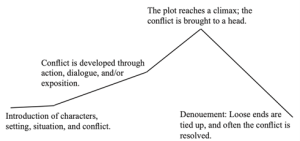23.3 Fiction
As a place where we can connect with one another as well as learn about ourselves, fiction indeed offers us a special brand of truth. Although history and philosophy pursue these goals as well, fiction is a narrative that is not bound to either historical events or scientific facts. The writer takes liberties with a fictional story, using his imagination to craft a plot that achieves the desired effect and meaning. The term narrative refers to the sequence of events in a story, often suggesting a cause-and-effect relationship among these events. A term that captures this concept more specifically, plot is defined as the sequence of events that develops the conflict and shapes the story. Rather than tell everything that might possibly happen to a character in certain circumstances, the writer carefully selects the details that will develop the plot, the characters, and the story’s themes and messages. The writer engages in character development in order to develop the plot and the meaning of the story, paying special attention to the protagonist, or main character. In a conventional story, the protagonist grows and/or changes as a result of having to negotiate the story’s central conflict. A character might be developed through exposition, in which the narrator simply tells us about this person. But more often, the character is developed through dialogue, point of view, and description of this person’s expressions and actions.
The traditional shape of a story is based on common conventions of Greek drama:

Short stories and novels often follow the hill-curve narrative shape illustrated above. Although a short story has much in common with a novel, it is written with much greater precision. Short stories must develop their effect and/or meaning in a much more limited space than novels. As a result, the plot elements of short stories must be chosen and crafted for efficiency, thus producing a narrow effect. A novel, on the other hand, provides room for more fully developed characters, setting details, and plot, which can include multiple threads following multiple characters.
Continue Reading: 23.4 Drama
